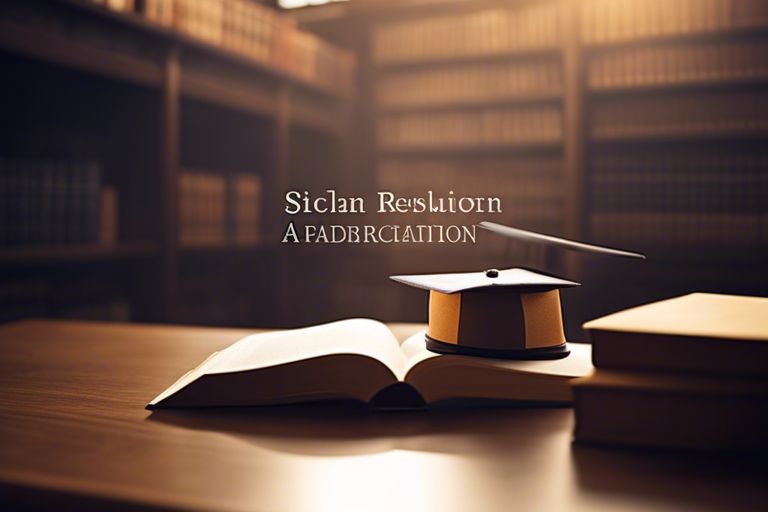Over the years, the field of conflict resolution has gained significant recognition as a crucial aspect of various disciplines. Pursuing a Doctorate of Conflict Resolution, commonly known as a PhD in Conflict Resolution, equips individuals with the necessary knowledge and expertise to navigate complex conflicts within diverse settings. This advanced degree program probes deep into theories, strategies, and practical applications, shaping scholars into competent professionals ready to tackle conflicts on local, national, and international levels.
Key Takeaways:
- Interdisciplinary Approach: A Doctorate of Conflict Resolution program typically takes an interdisciplinary approach, combining theories from fields such as psychology, sociology, law, and communication to understand and address conflicts effectively.
- Research Skills: PhD in Conflict Resolution programs equip students with advanced research skills, enabling them to conduct in-depth studies on conflict dynamics, mediation techniques, peacebuilding strategies, and more.
- Career Opportunities: Graduates of a Doctorate of Conflict Resolution program can pursue various career paths, including roles as researchers, consultants, mediators, educators, policymakers, and international development professionals in both public and private sectors.
Foundations of Conflict Resolution
Historical Perspectives
Before submerging into the complexities of conflict resolution, it is crucial to understand its historical context. An examination of ancient civilizations, religious texts, and early philosophical teachings reveals that conflicts have been a universal human experience since the beginning of time. Different cultures have developed diverse approaches to conflict resolution, laying the groundwork for modern practices.
Key Theoretical Frameworks
Conflict resolution draws from various key theoretical frameworks that provide insights into the nature of conflicts and ways to address them effectively. Conflict theorists emphasize power dynamics and structural inequalities that underpin conflicts, while social psychologists focus on interpersonal relationships and communication styles. Understanding these frameworks helps practitioners analyze conflicts comprehensively and develop appropriate interventions.

Core Components of the Doctorate Program
Curriculum Overview
Program curriculum is designed to provide a comprehensive understanding of conflict resolution theories, practices, and applications. Students examine into subjects like negotiation, mediation, peacebuilding, and international diplomacy.
Research Methodologies
Doctorate candidates are trained in various research methodologies including qualitative and quantitative approaches. They learn how to conduct thorough literature reviews, collect data, analyze results, and draw meaningful conclusions to contribute to the field of conflict resolution.
Core to the Doctorate program is the emphasis on rigorous research methodologies. Candidates are guided on how to formulate research questions, design studies, and employ appropriate methods to explore complex issues in conflict resolution.

Practical Applications of Doctoral Research
Policy Impact
With a Doctorate in Conflict Resolution, you can have a significant policy impact by influencing decision-making at various levels of government and organizations. By conducting research in areas such as Conflict Analysis and Resolution, PhD – GMU Catalog, you can provide valuable insights and recommendations that can shape policies to address and prevent conflicts.
Organizational Conflict Management
Research shows that organizational conflict can significantly impact employee morale, productivity, and overall success. By specializing in Organizational Conflict Management, you can develop strategies and interventions to effectively resolve conflicts within a workplace setting. This can help organizations create a more harmonious and productive work environment.

Future Directions in Conflict Resolution Studies
Emerging Trends and Challenges
Future conflict resolution studies are likely to see an increase in the use of technology such as artificial intelligence and machine learning for mediation and negotiation processes. Additionally, the field may also focus more on exploring the intersection of conflict resolution with other disciplines such as psychology, sociology, and anthropology, to enhance understanding and develop more effective strategies for resolving conflicts.
Interdisciplinary Approaches and Innovation
Resolution of conflicts is taking on innovative forms with the integration of various disciplines. By collaborating with experts in fields like data analytics, neuroscience, and economics, conflict resolution studies can harness diverse perspectives and methodologies to devise novel approaches and solutions for complex conflicts. This interdisciplinary approach paves the way for more impactful and sustainable resolutions.
Conclusion
As a reminder, pursuing a Doctorate of Conflict Resolution (PhD in Conflict Resolution) equips students with advanced knowledge and skills to address complex conflicts in various settings. The program offers a comprehensive understanding of conflict theory, research methods, and practical tools for effective conflict resolution. Graduates are prepared to make significant contributions to society by promoting peace, justice, and positive change through their work in conflict resolution.
FAQ
Q: What is a Doctorate of Conflict Resolution?
A: A Doctorate of Conflict Resolution, also known as a PhD in Conflict Resolution, is the highest academic degree one can earn in the field of conflict resolution. It involves in-depth study, research, and the development of expertise in resolving conflicts in various settings.
Q: What are the benefits of earning a Doctorate of Conflict Resolution?
A: Earning a Doctorate of Conflict Resolution can lead to advanced career opportunities in fields such as mediation, negotiation, peacebuilding, and conflict management. It also allows individuals to make significant contributions to the understanding and resolution of conflicts at a higher level.
Q: What can I expect from a Doctorate of Conflict Resolution program?
A: Doctorate of Conflict Resolution programs typically involve coursework, comprehensive exams, dissertation research, and possibly teaching requirements. Students can expect to engage with advanced theories, research methods, and practical applications of conflict resolution throughout the program.

